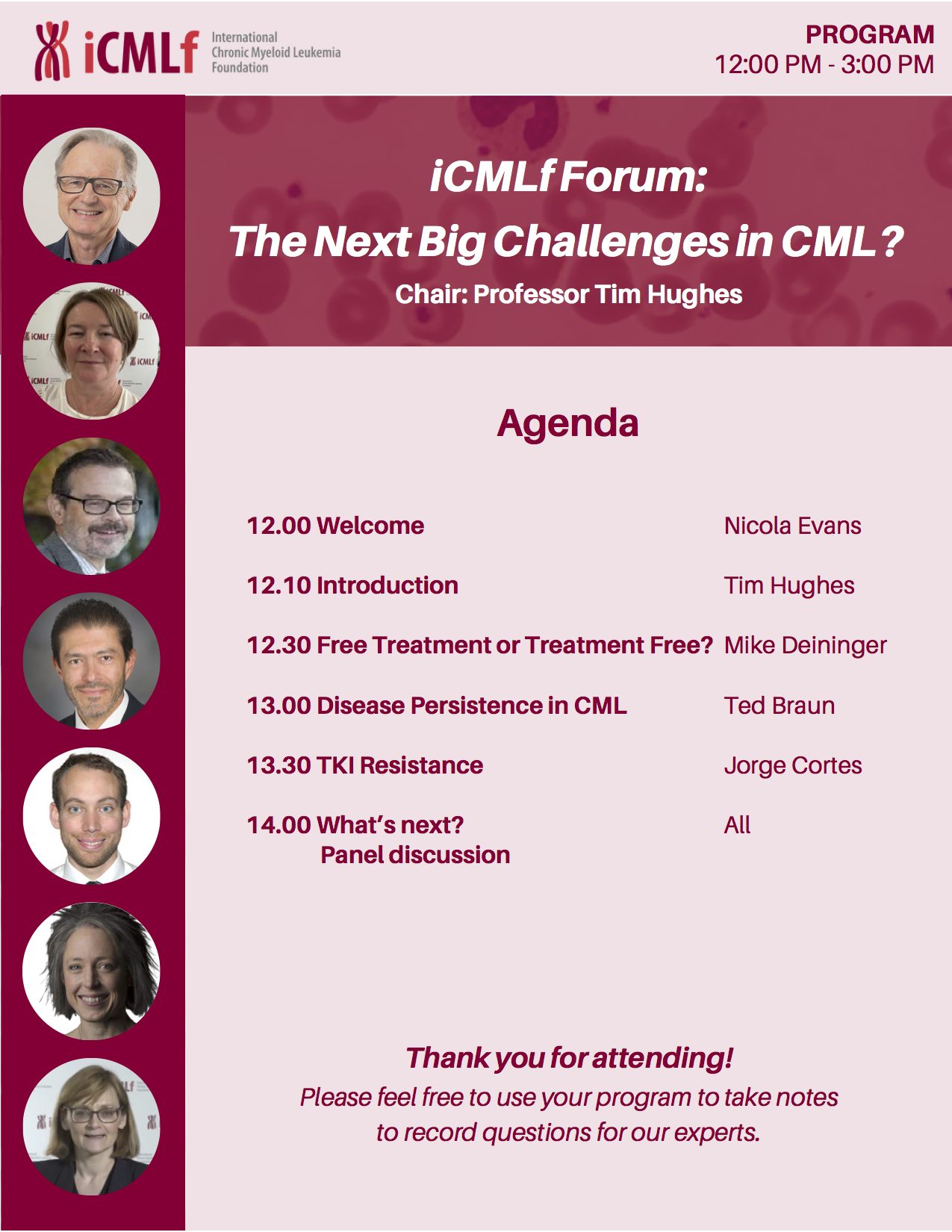 February 2022 - At the iCMLf Forum in December, we brought together a panel of leading experts and patient advocates to discuss the next big challenges and future directions in CML.
February 2022 - At the iCMLf Forum in December, we brought together a panel of leading experts and patient advocates to discuss the next big challenges and future directions in CML.
If you would like like to hear more about these key areas of research including; disease persistence in CML, treatment-free remission for all and TKI resistance in addition to BCR::ABL1 mutations – view the Forum videos on the iCMLf website.
We also take the opportunity to say a big THANK YOU to everyone who sent us the research questions that you believe need to be answered to help us move closer to a CML cure over the next 5-10 years.
The Next Big Challenges in CML? – Available to view
All presentations from the iCMLf Forum ‘The Next Big Challenges in CML’ that took place on December 9th during the Annual Meeting of ASH are now available to view on the iCMLf website.
- TKI resistance: More than just Abl mutations
Professor Jorge Cortes (Augusta, USA)
Topics include: TKI resistance - still a major problem; contraindicated mutations for TKIs; BCR-ABL1 KD mutations after failure/warning, BCR::ABL1 mutations at the end of treatment, mechanisms of resistance to TKIs, other mechanisms of TKI resistance in CML, drug-to-drug interactions with TKIs, CML molecular heterogeneity, cancer-associated mutations in AP/BC, clonal hierarchy in CML and an update on the iCMLf Global Genomics Alliance. - Disease Persistence in CML: Cell Intrinsic and Extrinsic Mechanisms
Assistant Professor Ted Braun (Portland, USA)
Topics include: The symptom burden of a life of TKI, patterns of persistence, why do BCR-ABL1 positive cells persist?, CML cell persistence: signalling pathway reactivation and epigenetic dysfunction, the Philadelphia chromosome beyond BCR::ABL1, the argument for immune control, the argument for intrinsic mechanisms, future directions. - Free Treatment or Treatment Free? Where to invest limited resources in a highly manageable cancer
Professor Michael Deininger (Wisconsin, USA)
Topics include: Access to care vs. new technologies in LMICs; how do we deploy limited resources to achieve maximum impact?; TFR - will it ever be possible to predict TFR?; finding the holy grail: finding the weak spot in CML stems cells and corresponding obstacles; how far can we go with BCR::ABL1 kinase inhibition alone? - Introduction to the key challenges
Professor Timothy Hughes (Adelaide, Australia)
Topics include: Top 5 CML challenges in low and middle income countries (LMICs), top 5 global CML challenges, update on TFR including best predictors of TFR, asciminib data including ASCEMBL study design and interim analysis, update on the iCMLf Global TFR Alliance; results from the pre-meeting survey. - Panel discussion: The next big challenges in CML
Discussion with the speakers, Lisa Machado the Canadian CML Network Executive Director and Dr Delphine Réa from Hôpital Saint-Louis, Paris.
View all presentations and discussions at the iCMLf Forum 2022 here
iCMLf Forum 2022 – Results from the pre-meeting survey
We asked you the following question: In your opinion what are 2-3 research questions that you think need to be answered to help us move closer to a CML cure over the next 5-10 years?
Your answers helped us shape the discussion and focus on key topics at the iCMLf Forum, but there is so much more to discuss as we all work together towards a cure for CML.
In the meantime, here is a snapshot of key areas where you suggested to focus CML research:
- Achieving Global health equity: Availability of diagnostics + 2nd generation TKIs
- Genomic analysis / disease prediction
- High-risk patients/resistance
- Management of side effects
- Combination therapy
- Therapy of blast crisis
- Discontinuation of therapy / Treatment-free remission
- Elimination of quiescent leukemic stem cells
- Cure for CML
Tim Hughes’ presentation discusses more survey results (starting from 23.00)
Do you have any further ideas / burning research questions? The survey is still open.
You can leave your comment here for future discussions










